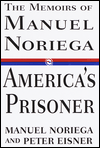|

The Memoirs of
Manuel Noriega,
America's
Prisoner
ISBN:
0-679-43227-2
American public opinion has a notoriously short
attention span, so the saying goes in political circles, and in fact public
memory regarding Manuel Antonio Noriega, has been fleeting. He
was for many years an ally of U.S. interests in the country of
Panama, rose to become General and then President of that country, later to
be described as a thug, and drug trafficker--as dictator, or as Colin Powell
described him,
"evil."
The Memoirs of Manuel Noriega, were written as the
former General languished in a federal prison just 12 miles south of Miami,
written with the assistance of an American journalist Peter Eisner of
Newsday. The book warrants attention, perhaps now more so than when it hit
the bookstores in 1997. Why ? What the book traces for us is a 'modus
operandi' by Neoconservatives tied to CIA, the Pentagon, of creating conditions
for facilitating outcomes advantageous to U.S. foreign policy. Outcomes
that use harsh measures, and harsh people--dictators, assassins, hardly
ever representative of democratic and humanitarian principles--to accomplish
pre-conceived ends. First, demonize, use methods of propaganda and
lies, then unleash a barrage of violent action and subdue the target of
aggression. We see it here in Noriega's case, later in Iraq in the case of
Saddam Hussein, and the lesson gained is the 'modus operandi' of those at the
helm of power in the United States of America. What is interesting to note is
that many of the people that today are at the helm of American
political power, were at work behind the scenes during the Reagan era, and
subsequent George H. W. Bush
administration.
Noriega flatly denies the charges, which were
levied against him; dictator, drug trafficker, or as thug, and Eisner
during his investigation uncovers a plot hashed by the Justice and State
Departments to frame Manuel Noriega. Eisner contacts the witnesses at
Noriega's trial, who recant their testimony, and provide the reasons for
their testimony as a result of 'deals that they could not
refuse.'
"Rarely has a figure in this century been so
universally vilified as Manuel Antonio Noriega. By 1993 when I was asked
by Random House to interview Noriega--the deposed General and former leader of
Panama... his infamy had become a matter of history. It had been four
years since the United States had invaded his country, killed untold hundreds of
Panamanians and brought him back to the United States in chains to face drug
charges... In post-cold war America, Noriega was perhaps the first figure to be
thus endowed with the inhuman qualities he is remembered for--pure 'evil'... 'a
crazed dictator' in the words of Washington policy makers; 'just another crooked
cop,' in the words of the U.S. prosecutors who later were found to have
negotiated a deal with the Cali cocaine cartel to obtain witnesses to
testify against
him...
...Neither international human rights organizations
nor the U.S. State Department could identify more than a scattered handful of
politically related deaths in Panama in twenty years of military rule, nor did
they cite huge numbers of political prisoners, massive exiles avoiding
persecution or any of the other conditions of an extreme police state."
(p.
xiii-xv, Introduction
)
Noriega's rule was in truth rather benign, compared
to others whom the United States has supported--the likes of Pinochet, Somoza,
even assassins like Roberto D'Aubuisson.
George H. W. Bush pushed for Noriega's capture
replete with a vicious military invasion in December 1989. Mexican
Catholic Bishop Mendez Arce said of it: "The
United States approved the unjust invasion and the consequent destruction,
mistreatment and massacre of the Panamanian people. For us it seems to be
serious proof that systemic lies are capable of corrupting the American
people. What a detestable and shameful panorama it is to see that a
government that considers itself to be a champion of democracy and justice can
ignore international order and assume the roles of police, judge, jury, and
executioner for everyone
else."
Why read Noriega's Memoirs ? Perhaps for no
other reason than to get a glimpse of comparison into the propaganda Bush
machine that builds a mantra of 'evil' around those it seeks to destroy. A
shroud that it carefully builds for the benefit of public opinion, before
venturing into its wars of aggression--be it in Panama, Iraq or in geopolitical
'hotspots' to come. This is how the Neocon-Bush machine destroys its
'enemies.' What does Noriega say then, was the rationale for U.S.
aggression
?
"I said no too many times, I refused to allow them
to use Panama as a base [on behalf of the Contras]... The closing of the Panama
School of the Americas [the U.S. Army School of Assassins] in 1982 was mandated
as one of the first tangible changes under the Torrijos-Carter treaties of
1977-78. The United States was well aware of the provision, but the Reagan
administration just couldn't swallow it. As determined and proud as we
were to follow through with Torrijo's legacy, the United States didn't want any
of this to happen. They wanted an extension or a renegotiation for the
installation, saying that with their growing war preparations in Central
America, they still needed it. But the School of the Americas was an
embarrassment to us. We didn't want a training ground for death squads and
repressive right-wing militaries on our soil." (p.114)
Are these the words of an evil dictator, a thug ?
Meanwhile the School of the Americas is currently based in Georgia, has changed
names but continues to operate, training foreign armies as well as our own, in
the 'fine' techniques of torture, death, and assassination.
Wherein lies the evil ?
Posted April 03, 2005
URL: www.thecitizenfsr.org
SM 2000-2011
You are here: HOME page-BOOKS-BIOGRAPHY
Previous : ACTIVISM Next : CIVIL RIGHTS
|